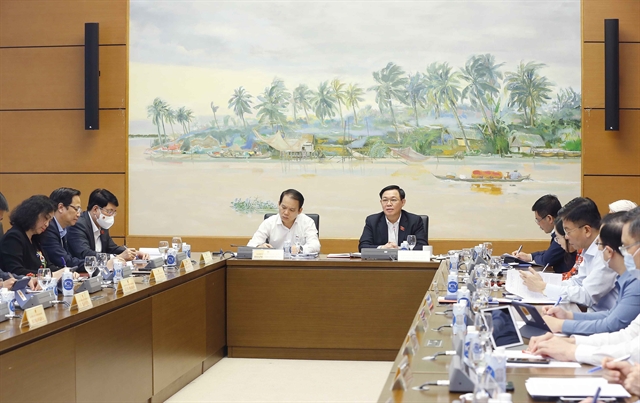
HÀ NỘI — As COVID-19 vaccines are still new, Việt Nam should exchange experience and learn from other countries when giving doses to those aged 12 to 17 this year and children below three years old next year, said Minister of Health Nguyễn Thanh Long at a group discussion of the 15th National Assembly (NA) on Thursday.
The deputies gathered in groups on Thursday morning to discuss the implementation and outcomes of the 2021 socio-economic development plan, the draft development plan for next year, the report on COVID-19 prevention and control and the implementation of Resolution No 30/2021/QH15 issued at the NA’s first session in July.
Minister of health Long said: “We have to accept the fact that the coronavirus is mutating and its pathogen cannot be completely eliminated. If we want to switch to safe adaptation with the pandemic, there is no other way but to ensure vaccine coverage.”
He said the international business community had offered assistance to the health ministry and HCM City to purchase testing kits and other medical equipment.
The minister said that the ministry would urge local authorities to cover the first vaccine dose for about 80 per cent of people aged above 18 and plan to vaccinate children.
Trần Thị Nhị Hà, director of Hà Nội Department of Health, said the city had prepared a plan to vaccinate children but it must follow the order of the health ministry in terms of age and number of vaccines.
Deputy Nguyễn Xuân Thắng, from Quảng Ninh's delegation, president of Hồ Chí Minh National Academy of Politics and chairman of the Central Theoretical Council, said the change of COVID-19 prevention strategy from zero COVID to safe living, flexible adaptation and effective control to hit dual targets of the pandemic containment and socio-economic development was a turning point.
He said there needed to be specific solutions to attract labourers back to resume production.
Minister of Internal Affairs Phạm Thị Thanh Trà spoke highly of socio-economic development reports submitted by the Government and NA agencies.
The fourth wave of the pandemic has posed adverse impacts on all aspects. In such a difficult context, it is clear that drastic measures and flexible orders of the Central Party Committee, the NA and the Government proved effective, she said.
She highlighted bright spots of the economy such as macroeconomic stability and inflation control. The Party and the State have cared about social security and welfare, ensuring people's safety in unprecedented conditions.
Draft law on mobile police
In the afternoon, Minister of Public Security Tô Lâm submitted the draft law on mobile police.
He said the purpose of building the mobile police law is to perfect the legal framework and create a solid basis for the mobile police to perform their functions, duties and powers, contributing to the protection of national security, social order and safety.
The draft law clarifies seven groups of mobile police tasks inherited from the mobile police ordinance issued in 2013 and adds two duties.
Minister Lâm submitted two options to the NA.
In the first proposal, mobile police include the Mobile Police Command and city/provincial mobile police forces. The Minister of Public Security will issue detailed instructions on the organisational system of the mobile police.
In the second proposal, the mobile police structure consists of six forces including special combat force, special task force, target protection force, training force, force using aircraft, ships and combat reserve mobile police force.
The same day Minister of Science and Technology Huỳnh Thành Đạt submitted the draft law amending and supplementing some articles of the Intellectual Property Law.
Legislators later discussed the bill in groups. — VNS